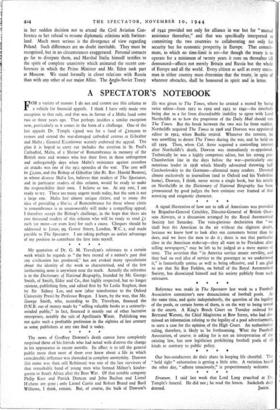My quotation of Dr. G. M. Trevelyan's reference to a
certain work which he regards as " the best record of a nation's past that any civilisation has produced;' has not evoked many speculations about the identity of the work so characterised, and of the few forthcoming none is anywhere near the mark. Actually the reference is to the Dictionary of National Biography, founded by Mr. George. Smith, of Smith, Elder and Co., that highly respected, but no longer existent, publishing firm, and edited first by Sir Leslie Stephen, then by Sir Sidney Lee, and now (after transference to the Oxford University Press) by Professor Brogan. I learn, by the way, that Mr. George Smith, who, according to Dr. Trevelyan, financed the D.N.B. out of money made by " selling valuable books to a seriously- minded public," in fact, financed it mainly out of other lucrative enterprises, notably the sale of Apollinaris Water. Publishing was not quite such a profitable profession in the eighties of last century as some publishers at any rate find it today.
* * * * The news of Geoffrey Dawson's death cannot have completely surprised those of his friends who had noted with distress the change in his appearance in recent months. Its effect is to tell the general public more than most of them ever knew about a life in which considerable influence was shrouded in complete anonymity. Dawson (his name was then still Robinson) was one of the, last survivors of that remarkable band of young men who formed Milner's kinder- garten in South Africa after the Boer War. Of that notable company Philip Kerr and Patrick Duncan and John Buchan and Lionel }lichens are gone ; only Lionel Curtis and Robert Brand and Basil Williams, I think, remain. But, of course, the bulk of Dawson's


























 Previous page
Previous page